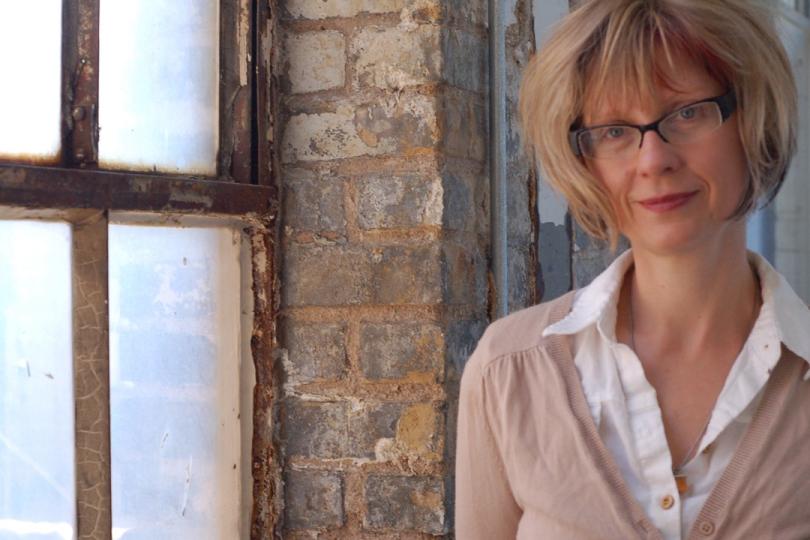Becoming Airborne with Kira Obolensky

Playwright Kira Obolensky, currently a Core Writer and Board Member at the Playwrights Center, is known for immersive, imaginative plays. As playwright in residence at Ten Thousand Things Theater, Obolensky plays with the epic and the intimate, fitting big myths into the spare style of the itinerant company. We spoke via email about the new worlds she makes on stage.
How did you come to playwriting?
I found the Playwrights’ Center. I’d been an English major in college, wrote some poetry, and afterwards had worked making artists’ books. I took a class and discovered that writing plays tapped into my visual sensibilities, a poetic ear and a love for spectacle.
How did you come to the Twin Cities?
I came here after college on the east coast. My husband is from the area and when I first moved here I worked as an intern (I think I was the first one!) at the brand new Minnesota Center for Book Arts.
What's your favorite part of the process of bringing a play to the stage? Is there any part you dread?
I love writing the play, actually—writing for me is a way, I suppose, to create the world I want to see. I also really love hearing the play with actors for the first time. During my time with Ten Thousand Things, we’ve developed a sort of lovely ritual, which is that I invite everyone—actors, Michelle Hensley, staff—over to my house for dinner and then we read through, sitting around in a big circle in the living room. I’m not sure I dread too much, but I’ve certainly sat through shows that have been, as they say, excruciating. That’s not ever fun.
I'm really interested in your relationship with Ten Thousand Things. What makes your partnership successful and what advice can you offer to other playwrights and companies who want to emulate your process?
I can’t think of anything better for a playwright, actually. To be in residence with a company that has a clear mission and purpose; to write for audiences that are as inclusive and wide-ranging as this theater’s audiences are—to have those audiences in my imagination as I write has changed everything for me about my art form.
I think there are several things that make our relationship successful: I made a commitment to this position, to this job—this is what I’m doing and I’m doing it as completely and fully as I can. There’s a lot of pressure to build a career, I think especially for bigger writers. I’ve focused instead on the job and purpose of the relationship.
I also think the people I work with at Ten Thousand Things —staff, actors, design staff, musical director, all of them—are flat out amazing. It’s a small staff and a small organization without any of that hierarchical bullshit that can go on in bigger theater companies. We don’t have an office; everyone just has a job that we all show up and perform to the best of our abilities. I think sometimes it’s harder to insert a playwright into a bigger company; they can get lost in the shuffle.
What's your favorite metaphor for making a play? –
I define a play as a blueprint for the imagination—the imagination of your collaborators and for the audience. My favorite metaphor, I guess, would be building an airplane, a smaller one, maybe with a propeller engine. I think there’s a lot of collaborative work, a lot of moving parts to putting a play together…and then when we bring audiences in, there’s the question: Will it become airborne? Will it fly?
Is there anything that the Twin Cities theater community specifically could be doing differently to support playwrights?
Look, we’ve got the premiere new play development center in the country right here. We have so many amazing playwrights who come here for fellowship opportunities, or who live here because of those fellowships. There are a lot of great new plays! I always wonder about why smaller theater companies—or a bigger ones, too—will produce a new play, but usually one that’s been vetted by New York. Our audiences don’t care about that. They are hungry for new stories! We should support our local talent more. There’s a great support of local music, local food, local fiction writers—let’s celebrate all the great plays and playwrights who work here!
Why should companies do new work?
We have spent a lot of collective time in the theater re-imagining old plays and discovering their relevance to our time. But a new play presents a new world; it presents relationships not as they used to be but as they might be; it posits reflections, discoveries, questions that refer to our lives now. A new play, experienced collectively with our hearts and imaginations, allows us to re-imagine the world itself or to ask questions about how we might do just that.
What do you see as the future of playwriting?
I think playwriting is going to be more interactive; it’s going to discover (re-discover) that it’s strengths like in harnessing an audiences’ imaginations—not doing what film and tv do already and better. We’re going to enter into a new golden age of playwriting. Going to see a new play is going to be like church and like happy hour. And because theater simply has to become more inclusive of everyone, we’re going to be seeing a lot more plays that don’t happen in theaters.




